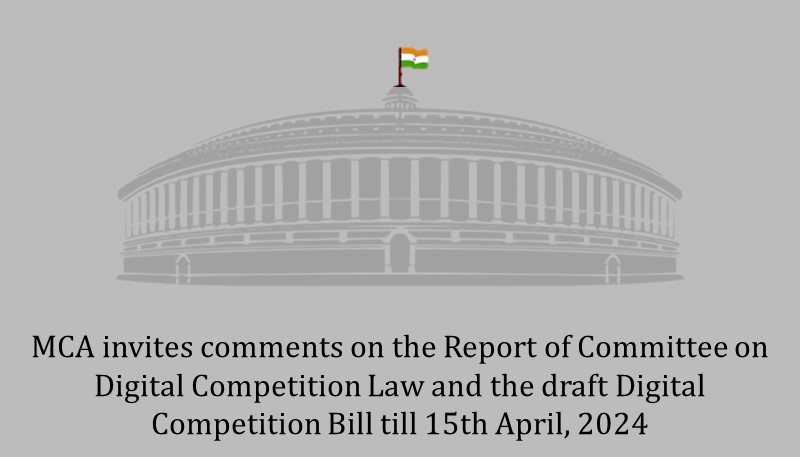The Ministry of Corporate Affairs (“MCA”) has recently invited comments on the (a) Report of Committee on Digital Competition Law and (b) the draft Digital Competition Bill till 15th April, 2024. The Report is placed under the section ‘Data & Reports [Reports>>> Library (Expert Committee Reports)]’ on the website of MCA (expected to be uploaded on 15-03-2024). A copy of the same can also be found on the MCA website under the ‘e-Consultation module’, and any comments or ideas can be sent on this module until April 15, 2024.
Background:
To examine the need for an ex-ante regulatory mechanism for digital markets in India, the Committee on Digital Competition Law (Committee) was set up on 6th February, 2023. The Committee was tasked with the responsibility of reviewing the current provisions of the Competition Act, 2002; assessing whether they are sufficient to deal with challenges that have emerged from the digital economy; and evaluating whether a separate legislation to regulate digital markets is needed. The Report seeks to address the issues that are or may potentially become concerns in the anti-trust regime in the context of digital markets.
Key recommendations of the Committee
Introduction of a Digital Competition Act with ex-ante measures: The Committee recommends the introduction of an ex-ante legislation specifically applicable to large digital enterprises, to supplement the Competition Act. Such an ex-ante law should ensure that behaviours of large digital enterprises are proactively monitored, and that the CCI intervenes before instances of anti-competitive conduct transpire. A draft of the legislation (“Draft DCB”) as prepared and deliberated upon extensively by the Committee is enclosed as Annexure IV.
Scope and applicability: The Committee proposes that the Draft DCB should apply to a pre-identified list of Core Digital Services that are susceptible to concentration. The Committee recommends that this list is drawn up basis the CCI’s enforcement experience, market studies, and emerging global practices. Keeping in mind the pace at which digital markets are progressing, such a list is proposed as a Schedule to the Draft DCB to allow timely updations by the Central Government.
Regulation of digital enterprises with ‘significant presence’: The Committee recommends that the Draft DCB should only regulate enterprises which have a ‘significant presence’ in the provision of a Core Digital Service in India and the ability to influence the Indian digital market. The Committee recommends designating such enterprises as “Systemically Significant Digital Enterprises” (SSDEs)
Thresholds and criteria for designation as SSDEs: An enterprise is deemed an SSDE if it passes a twin test demonstrating ‘significant presence’: (a) the ‘significant financial strength’ test which comprises quantitative proxies of economic power, i.e. India-specific turnover, global turnover, global market capitalisation, and gross merchandise value; and (b) the ‘significant spread’ test which evaluates the extent to which an enterprise has been present in the provision of a Core Digital Service in India on the basis of the number of end-users and business users. The Draft DCB obligates enterprises to self-assess their fulfilment of these thresholds and report the same to the CCI. Additionally, the Draft DCB envisages residuary powers for designation in the form of ‘qualitative’ criteria for designating certain enterprises as SSDEs that do not meet the quantitative thresholds but nonetheless have the ability to significantly influence the market in which they operate.
Associate Digital Enterprises: The Committee recommends that in cases where enterprises providing Core Digital Services are part of a group, designation may not be limited to just one enterprise in the group. Depending on the involvement of different enterprises within the group in providing a Core Digital Service, the Committee envisages two scenarios: first, where the holding enterprise is designated as an SSDE and other enterprises within the group, directly or indirectly involved in provision of the same Core Digital Services, are designated as Associate Digital Enterprises to the SSDE (ADEs); and second, a non-holding enterprise most directly involved in providing the Core Digital Service is designated as an SSDE and its holding enterprise and other group entities directly or indirectly involved in providing the same Core Digital Services are designated as its ADEs. In this regard, the Committee recommends that the CCI be given flexibility to identify the appropriate enterprises for SSDE and ADE designations.
Obligations: The Committee recommends an agile and principle-based framework of ex-ante obligations under the Draft DCB. The specificities of the obligations as applicable to each Core Digital Service would be specified through regulations drafted by the CCI through a consultative process. The Committee, cognisant that not all SSDEs and ADEs providing the same Core Digital Service have the same degree of influence on the market within which they operate, recommends that the regulations may provide for differential obligations upon different SSDEs and ADEs depending on factors such as their business models and size of their user base.
Exemptions: The Committee recommends that the grounds for exemption from complying with the ex-ante obligations should be provided for in the statute itself. The features of such exemptions should be specified through regulations framed by the CCI, taking into account the particular Core Digital Service and related business models of SSDEs and their ADEs. The Committee also recommends including a provision like Section 54 of the Competition Act exempting certain classes of enterprises from the applicability of the statute.
Enforcement: The Committee recommends borrowing the procedural framework from the Competition Act for the purposes of the Draft DCB, given that the enforcement of both these laws is to be entrusted with the CCI. The Committee also strongly advises that the CCI must strengthen the capacity of its Digital Markets and Data Unit with experts from the field of technology to keep pace with the rapid evolution of digital markets. Further, the Committee recommends instituting a separate bench within the National Company Law Appellate Tribunal to ensure timely disposal of appeals filed against the CCI’s orders, particularly those relating to digital markets.
Remedies: The Committee proposes that a monetary penalty for non-compliance with ex-ante obligations is restricted to a maximum of 10% of the global turnover of the SSDE in line with the penalty regime under the Competition Act. Additionally, in cases where the SSDE is part of a group of enterprises, the Committee recommends that the ‘global turnover’ cap is calculated in relation to the turnover of the entire group. The Committee further recommends that the precise quantum of penalty be determined by the CCI with due regard to the penalty guidelines under the Draft DCB. In addition to the above, separate penalties have been provided for contraventions resulting from incorrect reporting and vicarious liability of key managerial persons
The Draft DCB aims to identify systemically significant digital enterprises and their associate digital enterprises, and to regulate their practices in the provision of core digital services, keeping in view the principles of contestability, fairness and transparency, with an objective to foster innovation, promote competition, protect the interest of users of such services in India, and for matters connected herewith and incidental thereto. An enterprise will be considered as a Systemically Significant Digital Enterprise (SSDE) in respect of a Core Digital Service, if, it meets any of the following financial thresholds in each of the three immediately preceding financial years:
- turnover in India of not less than INR 4000 crore; or
- global turnover of not less than USD 30 billion; or
- gross merchandise value in India of not less than INR 16000 crore; or
- global market capitalisation of not less than USD 75 billion, or its equivalent fair value of not less than USD 75 billion calculated in such manner as may be prescribed.
AND
it meets any of the following user thresholds in each of the immediately preceding three financial years in India:
(i) the core digital service provided by the enterprise has at least one crore end users; OR
(ii) the core digital service provided by the enterprise has at least ten thousand business users.
Provided that if the enterprise does not maintain or fails to furnish data mentioned in clause (a) or (b), it shall be deemed to be a Systemically Significant Digital Enterprise if it meets any of the thresholds stipulated in clause (a) or (b). The link to the Report of Committee on Digital Competition Law and draft Digital Competition Bill is given in the source below.
The link to the Report of Committee on Digital Competition Law and Draft Digital Competition Law is given in the source below:
Source: Ministry of Corporate Affairs





